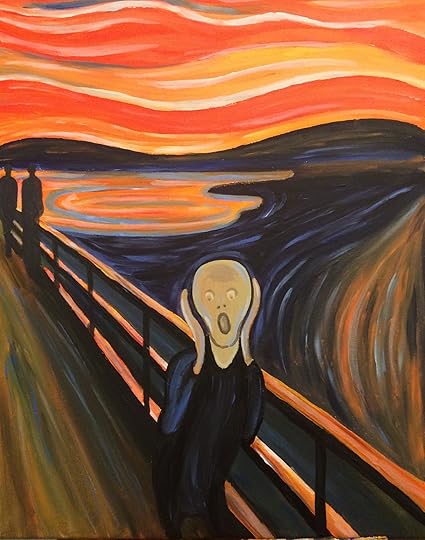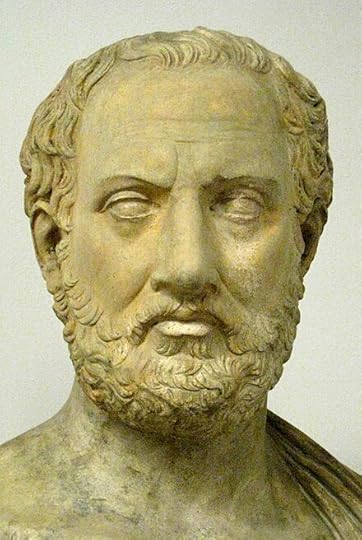Stephen Roney's Blog, page 55
January 9, 2024
The Voice of One Calling in the Wilderness

In a real sense, lying is the worst sin. It is a sin not just against man, but against God. It is direct defiance of God; for God is Truth: “I am the Way, the Truth and the Life.” Consistently lying to another under our control—gaslighting—causes the worst tortures known to man, the tortures we call depression and schizophrenia.
I cannot stomach politicians like Erin O’Toole, who lie without evident shame. Or Richard Nixon, or Bill and Hilary Clinton, or Justin Trudeau. Not much better are those who are deliberately ambiguous, so they can play games with the truth: Pope Francis falls into this category.
I cannot stomach men who claim to be women, or women who claim to be men, or those who claim to be non-binary. It is at base a moral issue.
Give me those clean, straight lines. The clarity of a Ratzinger, a Trump, an Orwell, a Michelangelo.
Make the ways straight for the Lord.
'Od's Blog: Catholic comments on the passing parade.
January 8, 2024
The New Canada
Looks more like Nazi Germany or Soviet Russia every day.
'Od's Blog: Catholic comments on the passing parade.How Do You Respond to Something Like This?
The Democrats assume the average American voter is a gullible idiot. What if they are right?
https://twitter.com/i/status/1743635357160145330
Hell Alley

There are suggestions in the Bible that few people make itto heaven.
“Narrow is the path that leads to life, and few find it.”
Many read the book of Revelations to say that only 144,000all told make it to heaven.
The visionaries of Fatima saw multitudes falling into hell.
This is troubling.
I wonder, however, if this is literal. It sounds to me likethe Buddha’s description of upaya in the Lotus Sutra: whatever isnecessary to lure the children out of the burning building. It is perhaps notso much an accurate description of the population of Hell or the consequencesof sin, as a strategic or rhetorical device to illustrate the right path.
The point may more accurately be, we cannot get to heaven bygoing along with the crowd; by doing what everyone else does.
This is necessarily true, because going along with thecrowd, or with others around us, or the social consensus, avoids making moraldecisions; so we cannot be earning merit even if the deed is objectively good.It is the easy way, and, if by chance also the moral way, as Jesus says, “youalready have your reward.”
But the situation is worse than that. Any crowd or social environmentwill tend toward the evil. As the Bible says, the Devil is the prince of thisworld. Those guilty of sin will have a vested interest in promoting that sin, encouragingothers to that sin, avoiding personal responsibility for it. Those who go alongwill go along, making the sin conventional. As happened in Sodom and Gomorrah; orthe world before the flood; or among the Canaanites or Carthaginians, whopracticed child sacrifice; or the extermination of Jews in Nazi Germany; or slaveryin so many countries; or abortion today. The worse the sin, the stronger thesocial pressure to condone it. So as not to cause a fuss.
“The best lack all conviction, while the worst
Are full of passionate intensity.”
So going along with the crowd, a failure to take moralresponsibility, is doubly culpable. It is doing objective evil, and refusing totake responsibility for it. Taken together, that looks like turning away from God himself, the sinagainst the Holy Spirit.
But does this interpretation give us any greater hope? Surely,by definition, if going along with the crowd leads to hell, most people must thereforebe destined for hell.
Not necessarily. It is actually possible that “the crowd” or“the social consensus” is not the majority. It could be only the largest singlegroup, the one that speaks with one voice, even if most people approach issuesindividually—since, after all, those who think for themselves do not operate asa crowd.
It is the NPCs; joined in Hell, of course, by those whothink for themselves but have chosen evil.
What proportion is that of the generalpopulation? Your guess is probably as good as mine.
There are suggestions in the Bible that few people make it to heaven.
“Narrow is the path that leads to life, and few find it.”
Many read the book of Revelations to say that only 144,000 all told make it to heaven.
The visionaries of Fatima saw multitudes falling into hell.
This is troubling.
I wonder, however, if this is literal. It sounds to me like the Buddha’s description of upaya in the Lotus Sutra: whatever is necessary to lure the children out of the burning building. It is perhaps not so much an accurate description of the population of Hell or the consequences of sin, as a strategic or rhetorical device to illustrate the right path.
The point may more accurately be, we cannot get to heaven by going along with the crowd; by doing what everyone else does.
This is necessarily true, because going along with the crowd, or with others around us, or the social consensus, avoids making moral decisions; so we cannot be earning merit even if the deed is objectively good. It is the easy way, and, if by chance also the moral way, as Jesus says, “you already have your reward.”
But the situation is worse than that. Any crowd or social environment will tend toward the evil. As the Bible says, the Devil is the prince of this world. Those guilty of sin will have a vested interest in promoting that sin, encouraging others to that sin, avoiding personal responsibility for it. Those who go along will go along, making the sin conventional. As happened in Sodom and Gomorrah; or the world before the flood; or among the Canaanites or Carthaginians, who practiced child sacrifice; or the extermination of Jews in Nazi Germany; or slavery in so many countries; or abortion today. The worse the sin, the stronger the social pressure to condone it. So as not to cause a fuss.
“The best lack all conviction, while the worstAre full of passionate intensity.”
So going along with the crowd, a failure to take moral responsibility, is doubly culpable. It is doing objective evil, and refusing to take responsibility for it. Taken together, that looks like turning away from God himself, the sin against the Holy Spirit.
But does this interpretation give us any greater hope? Surely, by definition, if going along with the crowd leads to hell, most people must therefore be destined for hell.
Not necessarily. It is actually possible, if not probable, that “the crowd” or “the social consensus” is not the majority. It could be only the largest single group, the one that speaks with one voice, even if most people approach issues individually—since, after all, those who think for themselves do not operate as a crowd.
It is the NPCs; joined in Hell, of course, by those who think for themselves but have chosen evil.
What proportion is that of the general population? Your guess is probably as good as mine.
'Od's Blog: Catholic comments on the passing parade.
January 7, 2024
Why Are Pigs Sprouting Wings?

There is apocalypse in the air. Governments are doing unaccountable things, as though they know something we don’t. Snow falls in Mecca; lightning strikes the Vatican; maybe such things happen in normal times, but people are now in the mood to notice. And then there are the growing claims about UFOs. Tucker Carlson says he knows things about UFOs so dark he will not even tell his wife, and “there is a spiritual aspect to it.”
Which last comment gets me thinking: here’s one explanation for what is going on.
Christopher Hitchens, seeking to debunk Christianity, argued the improbability that God would let mankind subsist on Earth for perhaps hundreds of thousands of years, right up until 1 AD, before revealing himself. What about all those previous generations? And why then did he do it in such a backwater, in Palestine?
Hitchens is exactly wrong. The early years of the Roman Empire were probably the first time in history that God could have sent a message to mankind, and expect it to reach from Britain in the West, to China in the East, and down to Ethiopia. The Roman Empire had, for the first time, secured those trade routes. And Christianity did quickly extend this far.
No doubt God was sending local revelations all along—which is why so many of the world’s myths seem to contain elements of the Gospel story, with avatars, virgin births, and the like. But until 1 AD, they inevitably stayed local.
And Palestine was not a backwater. Jerusalem is actually, literally, the centre of the populated world, now as it was then—the one spot from which it is easiest to get everywhere else. This is why Middle Eastern airlines have been so successful: their headquarters and stopover point is most efficiently located for everywhere else.
And this is true not only by air. Palestine is a land bridge, a funnel, that joins three continents, Africa, Asia, and Europe, and their trade routes. It is at the crossroads of the three great ancient civilizations, Egypt, Mesopotamia, and Greece-Rome.
And this is true by sea as well: it is roughly the meeting point of the Mediterranean with the Red Sea and the Arabian Sea, the necessary point of portage to go by sea from Europe to East Asia and vice versa. All lines of communication and travel met here. This was God’s megaphone.
Now… if either God or perhaps some alien civilization wants to send all of mankind a further message, we have just now reached a similar, but greater, inflection point. Now, with the internet, with smart phones, is the first time in history he/they could appear to all of us, all at once, without filter by government or earthly authority with their own self-interests.
We might now be getting the preparatory attention-getting signs; like the herald’s trumpet or the town crier’s bell. Or like John the Baptist in the New Testament. And the panic of Herod at the birth of a more legitimate ruler, or the mind-frame of Dostoyevsky’s Grand Inquisitor, may explain the current actions of governments.
I don’t jump immediately to the idea that these are the End Times. Perhaps; perhaps the beginning of the thousand-year just reign predicted in Revelations. Yet, more simply, revelation is ongoing, as it is throughout the Bible: there are repeated calls from God to return to faith and fealty, reminders that he is there, new and renewed covenants. In more recent years, we have seen apparitions of Mary calling us back to faith. She has even appeared on Egyptian TV. Now may be the time for an emphatic reminder, a visit from the boss himself, perhaps a renewed covenant.
Or, alternatively, now may be the opportunity for some more advanced civilization to make itself known and tell us what it feels we need to know.
I think, in the end, aliens are less likely. That hypothesis requires too many assumptions.
'Od's Blog: Catholic comments on the passing parade.
January 6, 2024
Counting Cats
 Dancing the bhangra in catface
Dancing the bhangra in catfaceI wonder if, from the broad view of history. Justin Trudeau’s premiership will look like the Canadian Liberal Party’s dead cat bounce.
I think that the Liberal Party was actually destroyed by Jean Chretien.
Before Chretien, the Grits did not have principles in an ideological sense, but it was the party of the Canadian ruling class, a gentlemen’s club, and it ran on noblesse oblige. As the Natural Governing Party, its mandate was at least plausibly and in the public mind to do what it thought was best for Canada as a whole, in a more or less pragmatic way, with good will toward all. This made sense in a country that, like Canada, was naturally rent by internal divisions.
Chretien broke that mold with his bareknuckle politics within the party. Internally, the party became a dictatorship. Now it was all about power and loyalty to the leader. There was no more room for gentlemen.
Which sacrificed the long-term future of the party to Chretien’s interests. Being a Liberal was all about whether you liked the current leader. The party from then on, and given the structures Chretien created, would stand and fall on the charisma of the current leader. There was no principled reason to be a Liberal.
So they struggled and swapped leaders in and out, the opposite of the longstanding Liberal tradition: Martin, Graham, Dion, Ignatieff, Rae. There was nothing there until they turned, in what seemed desperation, to Justin Trudeau. Surely there was hereditary charisma there?
It worked better than it should have. Pretty decent dead cat bounce. But after his first election, the best JT could do were bare pluralities, while actually behind in the popular vote. Now the body politic’s reflex twitching, partly due to force of Liberal habit, seems to have subsided. Partly due, in turn, to the fact that Trudeau has not been governing in the old Liberal pragmatic way, but has been partisan and divisive. Fully and finally obliterating the Liberal centrist brand. And he has been more dictatorial than Chretien.
Now, as generally with dictators, there is a problem with the succession. The Liberal Party previously always had a leader of the loyal opposition inside the party, a John Turner, a Paul Martin, a Paul Martin Sr., because there was room for it. There was always a reason to be a Liberal above and beyond loyalty to the current leader, and an accommodation for that, with some degree of mutual deference, within the party. This is important to a party’s survival, because, if the current leader is no longer popular, the new leader must not be too closely identified with him, but suggest renewal.
When Chretien left, even with a plausible successor available, the party spiralled into third party status because it lacked any underlying raison d’etre. Preserving a strong centrist party is always challenging, against the natural dichotomy of left and right. The process was not yet as far along at that point. Pulling it out of the death spiral with Trudeau seemed a very close shave then.
It seems unlikely that the Libs will again come up with someone plausible out of the ether before the party mechanism dissolves, being held together only by a chance at patronage and power, and the country moves on.
'Od's Blog: Catholic comments on the passing parade.
January 5, 2024
Shaken, Not Stirred

Stuff is happening. The videos of the January 6 events are coming out. Jeffrey Epstein’s client list is presumably coming out. X has broken the censorship. The polls are turning, and half the world is going into elections. You see a growing list of prominent people coming out as on the right, or moving from apostasy to faith. To cite one example, Dr. John Campbell, who seemed at the beginning of the pandemic such an establishment figure, has evolved into a radical, no longer trusting government. Or look at Elon Musk, previously the great champion of the left who was going to give us all electric cars.
I personally have found myself being contacted recently by old acquaintances who had previously informally written me off as a Catholic of intolerably “right-wing” opinions. And they’re acting like old friends.
I’ve been predicting it for ages; people are always slower on the uptake than I expect. But this year feels like the year. The wokery have lost the moral high ground, and have lost touch with reality to a point that is impossible not to mock. They are no longer cool. Soon no one will admit to ever having been on the left.
Someone has put together time-stamped video of the January 6 events, to show the overview. Of course, what they show is still selective, crafted to discredit the official “narrative.” But it seems clear that Trump had nothing to do with what went on at the Capitol, that it was organized and controlled by a few individuals, most obviously Ray Epps; that Epps and others orchestrating affairs were pretty obviously federal agents; that the police were undermanned and underequipped, either from incompetence or in order to create an incident. And the demonstrators, most not intending to do anything but demonstrate, but lacking their own leadership, look as though they just foolishly and impulsively fell into a trap.
I suspect it was an insurrection, but an insurrection comparable to the Reichstag fire: an inside job, an insurrection by some party in the deep state exploited if not created to seize more power.
As they have been doing since.
And the same, fairly obviously, could be said of the supposed “occupation” by the truckers in Canada. I cannot believe it was all organized by the government, but it was provoked, mischaracterized, and exploited to seize additional powers by those already in power. I mean, seriously: a slickly-produced Confederate flag at a Canadian truckers' rally? What significance would it have to a bunch of Canadian truckers? Southern pride? Yay slavery?
Or, indeed, the same looks suspiciously possible now of the Covid lockdowns; or even of Covid itself. No conspiracy theory seems too fanciful any longer. There are bad actors in government, and they want more power.
RFK Jr. suggests the real insurrection happened with the Kennedy assassination. The current upheavals are because they feel their power threatened by the common people. They fear Trump, because he is not their guy, not beholden to them and not susceptible to blackmail. They never expected him to win that election in 2016. Now they realize preserving the machinery of democracy is too dangerous. The people are no longer as easily led, and no longer to be trusted.
Scott Adams argues that, once you create an espionage organization within government, as the US did during WWII, and expanded for the Cold War, their seizure of power is inevitable. It is only a matter of time.
The default assumption is that it has already happened. Now we are seeing it, and it may be falling apart.
'Od's Blog: Catholic comments on the passing parade.
January 4, 2024
Madness and Civilization

A recent article somewhere listed famous people who were depressive or bipolar (‘manic depressive”).
They could have saved time and energy by simply noting “all famous writers and artists, all famous war leaders, and all famous philosophers.” No mystery, no news: Aristotle pointed this out over two thousand years ago. Problemats XXX: “Why is it that all those men who have become extraordinary in philosophy, politics, poetry, or the arts are obviously melancholic?”
I fear, however, that moderns grab the stick at the wrong end. The assumption seems to be that they did great stuff despite being mentally ill. “High functioning depressives.” Which is absurd, when the highest functioning of us all turn out to be depressives.
“Considered by many to be the greatest English writer in history, Charles Dickens, like many great writers, battled depression for his entire life. It was said that he went through long periods of insomnia whenever he started a new novel.
“To deal with his sleeplessness, Dickens would wander aimlessly around London, once covering 30 miles (48 km) in a single night. On the bright side, it’s been reported that his spirits would lift bit by bit as he made more and more progress on his stories.”
The real story is that Dickens would be driven to write a new novel by the chronic anxiety that caused his insomnia. The act of writing soothed the anxiety and depression.
I am reminded too of Socrates’s comment: “By all means marry. If you marry well, you will have a happy life. If you marry poorly, you will become a philosopher.”
An intolerable home situation, being abused, causes what we call depression.
Depression is principally a sense of loss of purpose and meaning to one’s life. This is the permanently damaging effect of abuse. It can be expressed as sadness or as anxiety, but these are just symptoms: the problem is a lack of meaning and direction. “What is the point of me?”
Art, or philosophy, is an effort to create meaning. One is reaching for the transcendental values, the things that bestow meaning. The artist is reaching for beauty; the philosopher is reaching for truth. And the lawgiver or military leader is reaching for justice, the moral good. With desperation, in such a case, and so with the greatest concentration and energy.
This is salvation for the mentally ill: to stop being "mentally ill" and become an artist, or a teacher, or a shaman.
But don’t many artists end up losing the battle, and committing suicide? Don’t many philosophers?
They do; because art or philosophy is the path, and only the initial path, and not the goal. The quest for meaning begins to yield solid results once it generates and confirms a religious conviction.
Artists who become religious do not commit suicide. Instead, the depression eases and recedes. Religion happens when art or religion achieve their goal.
'Od's Blog: Catholic comments on the passing parade.
January 3, 2024
Thucydides, Shut Your Trap

It is fashionable these days to warn of Thucydides’ trap: that when a hegemonic power is threatened by a rising power, war usually ensues. This is especially supposed to predict an inevitable clash between the US and China.
One can be more specific: the existing hegemon will try to knock out the rising power. The US will declare war on China. For it makes no sense for the rising power to initiate hostilities: their situation is improving and their hegemony inevitable so long as nothing rocks the boat. This was the case for Thucydides’ own example, the Peloponnesian War: started by Sparta, he maintained, to check the rising power of Athens.
But the model does not fit the facts; it is actually hard to find modern examples. The current Gaza affair was started by Hamas, far from the regional hegemon. Russia did not attack Ukraine because Ukraine was on the verge of supplanting it as the regional power.
Conversely, Britain and the US did not go to war as world hegemony passed from the one to the other. It was all managed on fairly good terms.
Hegemonic powers do not generally fight hard to save their hegemony. Instead, hegemonies decline from within, experiencing a growing lack of commitment, not wanting the burden of being responsible for everything. Witness the British Empire. Witness the Soviet Union. They greet the end with a sense of relief. Not with a bang, but a whimper.
Who fought hardest to preserve their overseas dominions? Portugal. The poorest and weakest of European powers.
In the real world of history, war seems most likely when a relatively minor, second-tier power is facing possible collapse, as a means of perhaps restoring its viability.
This makes sense: if your power is in obvious decline, and soon to go altogether, you want to use it before you lose it.
Hamas fits this model. The Palestinian cause was in obvious jeopardy due to the Abrahamic accords. The intifada had lost the backing of Egypt, Jordan, Saudi Arabia, the Gulf states—all the obvious allies. Peace between Israel and the Arabs was spreading, leaving the Palestinians stranded. So their desperate attack.
Witness Russia in Ukraine. Russia’s population is shrinking. The economy has been held together by oil, but fracking and the move away from carbon-based fuels made the future look dim.
Iraq invaded Kuwait because Saddam was in dire economic trouble. He owed Kuwait money, and he tried to seize the Kuwaiti oil fields.
Graham Allison cites World War I as an example of Thucydides’ trap: the UK wanted to knock back rising Germany. Yet this does not fit the facts: the war was started by Austria-Hungary, the weakest of the major participants, and the UK was late and reluctant in. Austria-Hungary was on the verge of collapse; it had the least to lose on a roll of the dice.
I believe Hitler started the Second World War because the Nazi economic programme was a Ponzi scheme. In fact, Hitler said so, to his associates, as he invaded Poland. If he couldn’t grab the assets, land, and industry of Austria, then Czechoslovakia, then Poland, then the Soviet Union, the whole thing would come down like a house of cards. As in the end it did.
Argentina invaded the Falklands when the regime risked imminent collapse. On the same principle, bankrupt Venezuela is now rattling sabres towards Guyana.
Militant Islamism has become a major factor recently not because Islam has become more dominant or intellectually vital in Muslim lands—but because growing exposure to Western ideas has threatened it.
The optimistic lesson from this is that whoever disturbs the peace is likely to lose the war. The bad news is, the next war is likely to come from some relatively unexpected quarter, not the adversary everyone has their eyes on.
January 2, 2024
Reading the Entrails by Gaslight

Many commentators on the right are optimistic about 2024. They do not give reasons; just an instinct that the tide has turned. I have that same feeling.
Perhaps it is telling that friend Xerxes, commentator on the left, has the opposite feeling, and is warning against facing the new year with optimism.
His first argument is that it is pure chance, and the fact that the last three years have been awful in just about everyone’s opinion makes it no more likely the next year will be good. His second argument is that, if we think things are terrible, we need to change our attitude. He uses that old saw, about a couple who asked their real estate agent if their new neighbours were friendly.
“What were they like at the last place you lived?” asks the real estate agent.Whatever the answer, the agent can safely say, “Then they’ll be the same here.”
His argument that experiencing a bad year makes it no more likely that the next year will be good is necessarily based on the assumption that there is no God. Given that the universe is just, it is fair to hope that good will come to balance present evil. This is the theological virtue of hope, and lacking it, assuming fate is merely random, is the deadly vice of acedia.
His next argument, that you are yourself the deciding factor, and responsible for your own good or bad luck, is similarly anti-christian. It is plausible only for Eastern religions who believe in reincarnation. As to the specific example, your new neighbours inevitably being no better nor worse than your old neighbours, that is easily disproven by crime statistics. There are good and bad neighbourhoods. Or ask the Jews who escaped the Nazis whether their new neighbours in Canada were just as bad as their old ones in Germany. Ask the Jews of Israel about their neighbours in Gaza. Ask, indeed, the many of us who came to North America to escape oppression and have a better life whether their new life is no better than their old. And if better, is it really because they changed their sullen attitude?
The Bible could not more clearly oppose this idea, that those who are suffering are responsible for their own suffering, and those who are materially fortunate are morally deserving. Read the Book of Job. Read the story of Dives and Lazarus. Read the Beatitudes. Read about that just man they crucified.
The left is hearing footsteps. They have long been in power, actually since the early 20th century in North America, and they are coming to realize there is widespread unrest. And they are trying to gaslight us.
'Od's Blog: Catholic comments on the passing parade.



